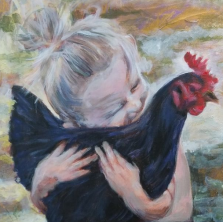We went to the Beekeeping Workshop at Levity Farms. This was an especially interesting workshop, since we have been toying with the idea of bees for awhile. Levity Farms is near us, and the host and hostess are interested in creating a little community, in addition to helping their little farm.
We still aren’t sure of whether to get bees or not, but we have more information.
Back Story
We’ve been toying with this for awhile. Here’s a blog post from the other day, just in case you forgot.
We’re also including this in something we call “human scale living”. Here’s a link.(link)
Our underlying theory is still that it is empowering to think of an air force of tiny little creatures flying around gathering food for us. We were reminded by the instructor, Bill Norris, that the bees don’t gather it for us, they gather it for themselves. Also, they won’t hesitate to sting you a few times to try to defend it either.
The workshop attendees, by the way, were about 75/25 female/male, and the crowd of about thirty was very respectful, and interested in the idea.
This is the first of what the Levity Farms people hope will be a series of workshops in the upcoming year.
Speaking of Levity, this goes back to at least 1949.
Beekeeping in Georgia
Beekeeping in Georgia actually dates back to the early 1700s, when European colonists first settled in the region. At that time, bees were kept primarily for their wax and honey, which were important commodities for both cooking and candle-making. However, over time, beekeeping in Georgia evolved to become an important part of the state’s agricultural industry, particularly in the production of honey.
During the early 20th century, the state’s beekeepers began organizing themselves into associations and clubs, which helped to standardize beekeeping practices and promote the industry. Today, Georgia is one of the top honey-producing states in the country, with an estimated 120,000 bee colonies and over 1,500 registered beekeepers.
One major factor that has contributed to the success of beekeeping in Georgia is the state’s warm climate and abundant natural resources, including a wide variety of flowering plants and trees that provide food for bees throughout the year. Additionally, the University of Georgia’s Honey Bee Program has played a critical role in supporting the industry through research, education, and outreach.
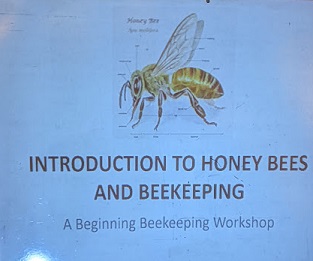
Levity Farms Introduction to Beekeeping Workshop
This was a nice, free flowing workshop by Bill Norris, an experienced beekeeper that moved into the lake country from Jasper.
Bill gave an overview of beekeeping, shared his experience with different hive types. The master beekeepers from the Georgia Beekeepers Association volunteer their time for education.
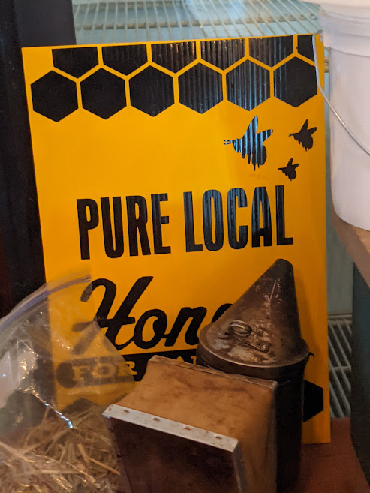
Fun Facts about Bees and Beekeeping
As we said above, bees are not aggressive, but will defend their home. There are a half dozen different species of honeybees in Georgia. The most popular of these is are Italian, which are relatively docile.
You need some bee gear. This includes a bee shirt, gloves, hat with net, and stinger remover. You can expect to be stung fairly repeatedly. Bee venom is reputed to be good as a treatment for arthritis.
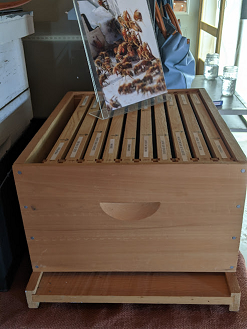
Bee Season
In this area, bees expand their population over the winter, and are ready to maximize honey gathering production in the spring. The honey is harvested in the early Summer, once the spring blooms go away. This period is called the “dearth”.
They don’t fly at night, and they navigate by GPS. They are also tuned into the smell of a given area.
Scouts will steal food from nearby hives, if the opportunity presents itself.
The Queen
Hive management is a lot about keeping track of the Queen Bee. This is similar to the human population. The Queen lays all of the eggs and also, is at the heart of the hive social order.
Interestingly, Honeybees are multi-generational. They have bees of all ages, and bees go to more complicated jobs the older they get. So, identifying, caring for, and if need be replacing the queen is essential.
Queens, along with bees in a general way, can be ordered and delivered. Once you have your gear set up, it’s fairly straightforward to order your bee population already adapted.
There are various ways to attract “free bees” from the area, if you don’t feel like spending the $150 for insects. According to Bill, there are no real “wild bees” still living in North America. Any of the honeybees you see are either cruising your area from a hive, or escapees. There are ways to lure them to your hive, if you are knowledgeable, although we don’t suppose we’d do such a thing intentionally.
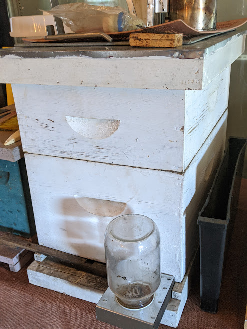
Honey and Honey By-Products
We suppose you don’t really need to have extra bugs around your house unless they’re going to provide you with something interesting.
The main products are honey, wax, and something called “propolis” which is tree resin that the bees collect to seal up holes in their hive.
All of this has a commercial value. Firstly, however, the main value is the pollination of your local flowers. Prior to World War 2, it was common to use bees to be used to pollenate crops.
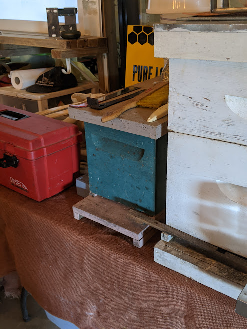
Bee Pests
It sounded a bit creepy, but in addition to bees, you can expect to attract a couple of species of moths and some mites. Bill didn’t suggest that any of this can affect people, but if it gets too bad, the bees will pack up and leave your hive.
So, one of the main maintenance activities is to watch your hive for pests, and deal with them without killing the good guys. As in the human population, pandemic survival tends to favor the hives that are healthy and otherwise in good shape.
Barring that, there’s actually some treatments you can use. About a third of the colony will be “anti-vaxx” and so you will have to deal with that from a disease management standpoint.
Beekeeping Workshop at Levity Farms: Setup Costs
| Equipment | Estimated Cost |
|---|---|
| Beehive (including bottom board, supers, frames, and covers) | $150 – $300 per hive |
| Protective Clothing (including veil, gloves, and suit) | $75 – $150 |
| Smoker | $30 – $50 |
| Hive tool | $10 – $15 |
| Feeder | $5 – $20 |
| Honey extractor | $150 – $500 |
| Uncapping knife | $20 – $30 |
| Strainer | $5 – $10 |
Here, courtesy of the link below, is a rough idea of beekeeping startup costs. The main item is the honey extractor, which is a centrifuge to extract the honey.
The idea was proposed to buy this and share it with your fellow local beekeepers to reduce the cost of startup, which would be a little “co-op.”.
The above table is about what Bill estimated the startup costs to be, so this is reasonably consistent. The startup costs can also be reduced by fabricating some of the items yourself.
Levity Farms Workshop Series
Along with serving a lovely lunch, and nice coffee, the Levity Farms crew was very hospitable. The scene was complete with running kids, cats, and big white barking dogs.
The plan is for there to be another workshop in a couple of weeks to actually set up a hive on the place, which they like because it is who they are.
This place is so interesting, in fact, that it’s worthy of another blog post.
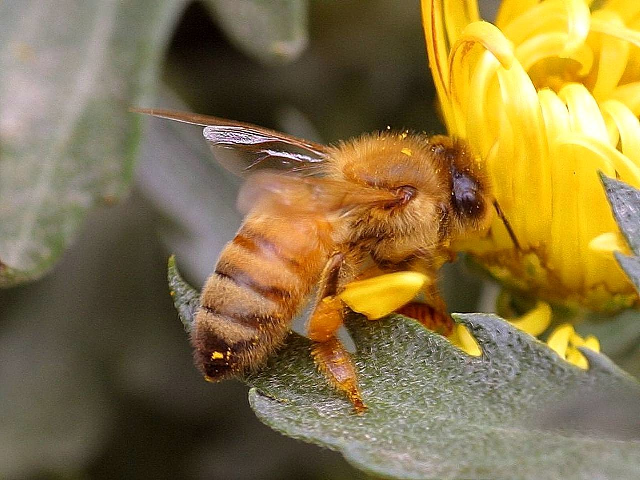
Do Over
Would we do this again? Well, we would have to say, in a general way, we know a lot about bees now. We we would certainly look for more information, and would love to participate in some of the other proposed workshops. The organizers, Zach and Alana, are working on a firm schedule, and are planning various other festivities, and we would be happy to participate in more of them.
The bees? Well that decision is still up in the air, as it applies to us.
Links and References
Georgia Beekeepers Association. (n.d.). History of beekeeping in Georgia. Retrieved from https://www.gabeekeeping.com/history-of-beekeeping-in-georgia.
Bee Nucs for Sale
https://mountainsweethoney.com/product-category/bees-nucs/
Beekeeping Startup Costs
Brushy Mountain Bee Farm. (n.d.). Basic Equipment for Beekeeping. Retrieved from https://www.brushymountainbeefarm.com/basic-equipment-for-beekeeping
![]()
